EMT AAOS
LINDSEY WILSON COLLEGE
All 21 results
Sort by
EMT AAOS FINAL EXAMS PACKAGE DEAL|2023/24 UPDATE|VERIFIED FOR ACCURACY|ALL GRADED A+|DOWNLOAD TO PASS
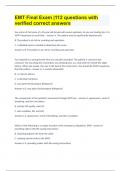
-
EMT Final Exam| 112 questions with verified correct answers.
- Exam (elaborations) • 16 pages • 2023
- Available in package deal
-
- $17.49
- + learn more
You arrive at the home of a 50-year-old female with severe epistaxis. As you are treating her, it is MOST important to recall that: A. The patient may be significantly hypertensive. B. The patient is at risk for vomiting and aspiration C. A detailed exam is needed to determine the cause Answer is B. The patient is at risk for vomiting and aspersion You respond to a young female who was sexually assaulted. The patient is conscious but confused. The last thing she remembers was drinking...
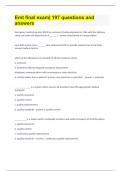
-
Emt final exam |197 questions and answers.
- Exam (elaborations) • 31 pages • 2023
- Available in package deal
-
- $15.49
- + learn more
Emergency medical services (EMS) as we know it today originated in 1966 with the highway safety act under the department of______? department of transportation each EMS system has a ______ who authorizes EMTs to provide medical care in the field. medical director which of the following is an example of off-line medical control. a. protocols b. telemetry with the hospital emergency department telephone communications with an emergency room physician d. written orders from a pa...
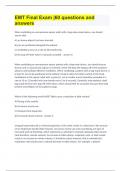
-
EMT Final Exam|60 questions and answers.
- Exam (elaborations) • 31 pages • 2023
- Available in package deal
-
- $15.49
- + learn more
When ventilating an unresponsive apneic adult with a bag-valve-mask device, you should ensure that: A) an airway adjunct has been inserted. B) you are positioned alongside the patient. C) ventilations occur at a rate of 20 breaths/min. D) the pop-off relief valve is manually occluded. A When ventilating an unresponsive apneic patient with a bag-mask device, you should ensure that an oral or nasal airway adjunct is inserted, which will keep the tongue off of the posterior pharynx and faci...
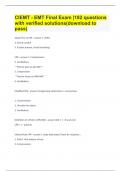
-
CIEMT - EMT Final Exam |182 questions with verified solutions(download to pass)
- Exam (elaborations) • 42 pages • 2023
- Available in package deal
-
- $14.99
- + learn more
Steps Prior to CPR 1. AVPU 2. Check carotid! 3. If pulse present, check breathing! CPR 1. Compressions 2. Ventilations *Partner goes to get AED* 3. Compression *Partner drops an OPA/NPA* 4. Ventilations Modified CPR Foreign body obstruction + unconscious 1. Compressions 2. Visualize for object 3. Ventilations Definition of a Peds in CPR/AED AED = 1 - 8 years old CPR = 1 - puberty Infants/Peds CPR 1. Baby baby baby! Check for response... 2. AVPU - fl...
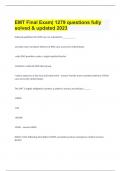
-
EMT Final Exam| 1279 questions fully solved & updated 2023
- Exam (elaborations) • 512 pages • 2023
- Available in package deal
-
- $16.49
- + learn more
National guidelines for EMS care are intended to __________. -provide more consistent delivery of EMS care across the United States -unify EMS providers under a single medical director -facilitate a national EMS labor group -reduce expenses at the local and state levels Provide more consistent delivery of EMS care across the United States The EMT is legally obligated to protect a patient's privacy according to _____. -HIPAA -CQI -APGAR -DCAP HIPAA Which o...
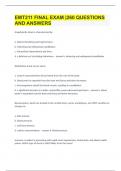
-
EMT211 FINAL EXAM| 260 QUESTIONS AND ANSWERS.
- Exam (elaborations) • 72 pages • 2023
- Available in package deal
-
- $13.99
- + learn more
Anaphylactic shock is characterized by: a. labored breathing and hypertension. b. wheezing and widespread vasodilation. c. intracellular hypovolemia and hives. d. a deficiency of circulating histamines. b. wheezing and widespread vasodilation Distributive shock occurs when: a. central vasoconstriction forces blood from the core of the body. b. blood pools in expanded vascular beds and tissue perfusion decreases. c. microorganisms attack the blood vessels, resulting in vasodila...
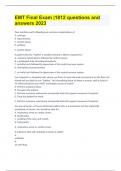
-
EMT Final Exam |1812 questions and answers 2023.
- Exam (elaborations) • 525 pages • 2023
- Available in package deal
-
- $20.19
- + learn more
Poor nutrition and GI bleeding are common complications of: A. syncope. B. hypertension. C. alcohol abuse. D. epilepsy. C. alcohol abuse. A patient who has "huffed" a volatile chemical is likely to experience: A. visionary hallucinations followed by violent nausea. B. a prolonged state of profound euphoria. C. an initial rush followed by depression of the central nervous system. D. immediate unconsciousness. C. an initial rush followed by depression of the central nervo...
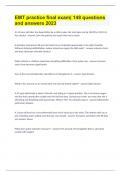
-
EMT practice final exam| 148 questions and answers 2023.
- Exam (elaborations) • 16 pages • 2023
- Available in package deal
-
- $15.49
- + learn more
An 18 year old hiker has been bitten by a rattle snake. His vital signs are bp 140/90 p 130 R 24. You should: Calm the patient and coach him not to move A pulseless and apneic 68 year old male has an implanted pacemaker in his right shoulder Without delaying defibrillation, where should you apply the AED pads? anterior chest and back (between shoulder blades) When infants or children experience breathing difficulties, their pulse may Increase early, then decrease significantly ...
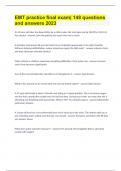
-
EMT FINAL EXAM JBLEARNING| 166 questions ALREADY GRADED A+.
- Exam (elaborations) • 16 pages • 2023
- Available in package deal
-
- $15.49
- + learn more
When assessing a conscious patient who overdosed on a drug, you should FIRST determine: A) the patient's weight in kg. B) the type of medication ingested. C) when the medication was ingested. D) if there is a history of prior overdose. B While triaging patients at a mass-casualty incident, you encounter a 4-year-old child who is breathing at a rate of 54 breaths/min. What should you do? A) Apply high-flow oxygen B) Tag the child as immediate C) Assess for distal pulses D) Ventil...

$6.50 for your textbook summary multiplied by 100 fellow students... Do the math: that's a lot of money! Don't be a thief of your own wallet and start uploading yours now. Discover all about earning on Stuvia


